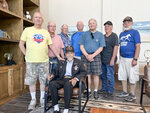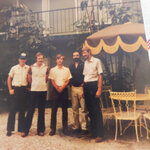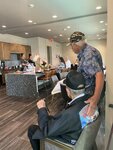


As we honored those who gave all this past Memorial Day, no one feels the solemnity of this day more than those who did return from combat to join their families.
Every year since 1978 at the reunion in Kentucky the Vietnam Veterans of Company C, 196 Light Infantry Brigade, American Division gather along with their wives to reminisce and to spend precious time together. The week prior to Memorial Day, the veterans visited Hood County as part of their itinerary for this year's reunion.
Granbury can now be included on the list of reunion sites for these soldiers that also includes LeClaire, Iowa; Keystone, South Dakota; Rapid City, South Dakota; Deadwood, South Dakota; Gatlinburg, Tennessee; Lake Geneva, Wisconsin; Jefferson City, Missouri; Mackinaw City, Michigan; Collinsville, Illinois; Little Rock, Arkansas; Manitou Springs, Colorado; New Orleans, Louisiana: San Antonio and many more.
Veterans enjoyed a tour of the small personal museum of Ben Musquez of Granbury at his home before enjoying a luncheon at Dolce Vita where the Musquez daughters cheerily served their parents, Ben and Maria, along with Ken Ruesch and wife Tai, Russ Wright and wife Gail, Frank Smith and wife Lana, Larry Ferguson, Tom Price and wife Jeanne, Gary Capshaw, Ching Lau and wife Jeanie, and Sandi Corman, widow of Lee Corman.
This year’s event was planned by Tom and Jean Price, Gary Capshaw and Ben and Maria Musquez. Each year, the event is planned by various members of the group. The veterans planned this year’s reunion to take place in Fort Worth with a jaunt to Granbury to make attending the reunion easier for Ben and Maria. Musquez was older than the company he led when he volunteered to lead these “boys” in Vietnam. No men were lost while Musquez led his soldiers.
“Maria and I hadn’t been able to join the past few years. Gary Capshaw is the ringleader, he worked for an international company overseas. He said to them ‘Let’s have it in Fort Worth so Ben and Maria can attend.’ Tom Seacrest and Marilyn wanted to attend but couldn’t at the last minute,” said Musquez.
The numbers vary to as few as three veterans or sometimes over 20, usually numbering somewhere in the teens. Some have barely missed a reunion but some have never attended.
Originally their numbers were more. “Company strength varied because of casualties, R & R or end of tour. Full strength (which we never saw) would have been about 140 men, but it got as low as 40 or so. Field strength was typically about three quarters of everybody assigned to the company,” shared Capshaw.
“Your title in the Army depends upon your assigned duty, which can often change as you advance in rank. Most of us started out as privates assigned to a platoon and squad, so our title would be rifleman unless we carried a weapon other than a rifle. Then it might be grenadier (the grenade launcher), RTO (radio telephone operator), or machine gunner/assistant machine gunner. At one time or another, I personally carried all three titles in Vietnam,” explained Capshaw. He went on, “We were infantry whose only function is to seek out and kill the enemy. That’s what we did.”
Capshaw also said, “I wish people could understand that while most of us are proud of having done our duty when others would not, we’re not particularly proud of the things we had to do. Essentially, the infantry during a war requires you to do just about everything you’ve ever been taught is morally wrong. What is good becomes a liability and what is morally reprehensible is now commendable. If you do enough bad, they give you a medal for it.
“After the war, our little band defied the stereotype of Vietnam veterans. Most of us worked at one, or a very few jobs, all our working life and nearly all of us have been married to the same woman for 50 years. We don’t have any raging alcoholics or drug addicts (though some did struggle with that for a while) and only one has been to prison. We all seemed to readjust fairly well, though that’s not to say we haven’t had our challenges. But we adapted and overcame, just like we did in Vietnam. While we did not break the mold of the ‘troubled veteran,’ we didn’t necessarily fit it snugly either.”
“The nation didn’t rally behind the troops. Nam veterans were looked down on and their service to their country was not acknowledged or appreciated,” said Smith.
“Many of us were drafted into service. It was a good experience in that I was exposed to many different cultures and many different personalities. People need to understand we were sent to do a job and that we did the best we could under trying circumstances,” shared Price.
Price continued, “The bond is serving together and having survived a fraught time in not only our country, but in the military. It was not a pleasant time coming home. There was no ‘Thank you for your service’ back then. Returning soldiers were routinely looked down upon and met with derision. I am glad that that has changed for these younger veterans.” Price was a sergeant and squad leader, and Smith was in his squad.
“There’s just something about sharing the misery, fear and ever-present specter of sudden, violent death which forced us to rely on each other, in spite of any differences we might have had. That common experience made us tighter than family out of necessity. Carrying that on into civilian life was a choice we made,” explained Capshaw.
But Capshaw states the best thing about the reunions is not the memories of war but rather the opportunity to know one another as human beings over the years and be a part of one another’s growing families.
The love that these veterans have for one another has not faded with time.
“We became closer than brothers in Nam,” said Smith, “and we feel the same way about each other to this day. The brothers who never came home are still remembered.”
Lau agrees.
“The best thing is getting together with my brothers. I don’t have a birth brother but these are my brothers!”